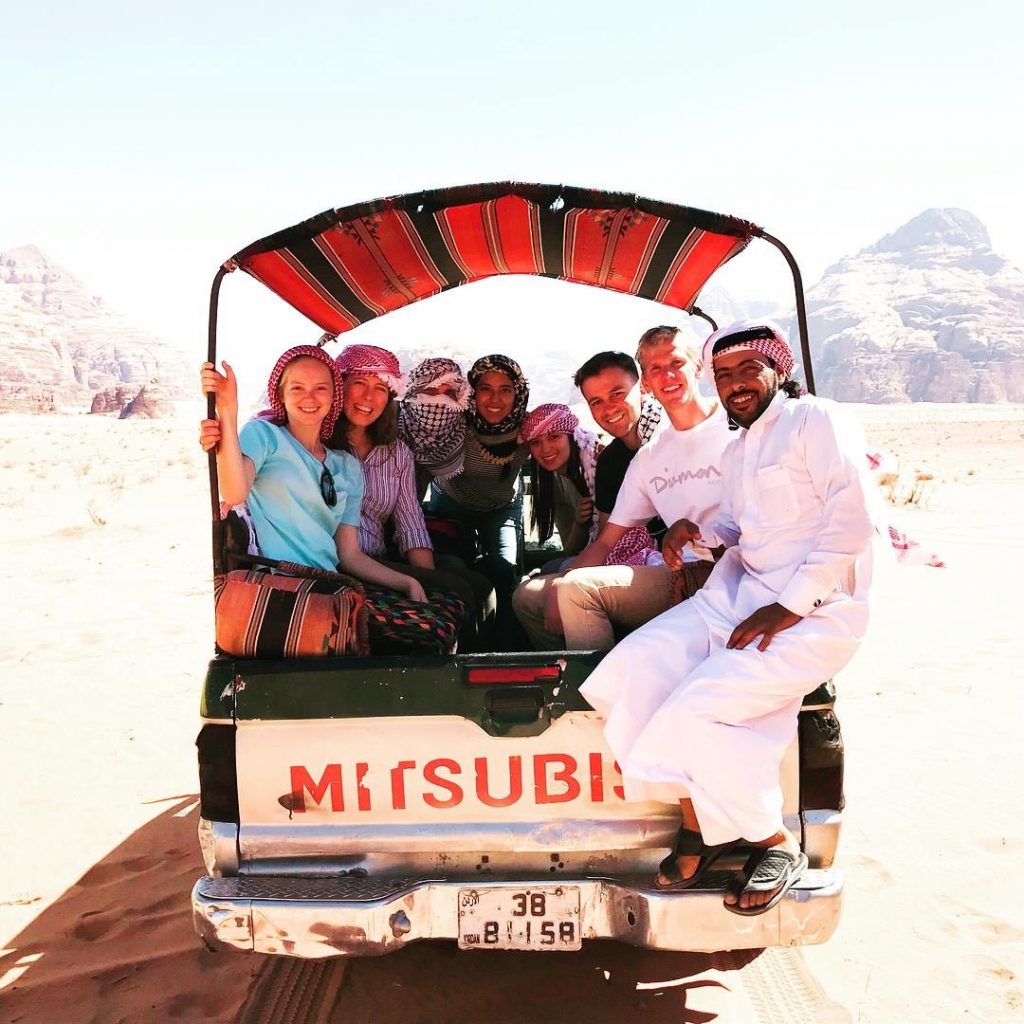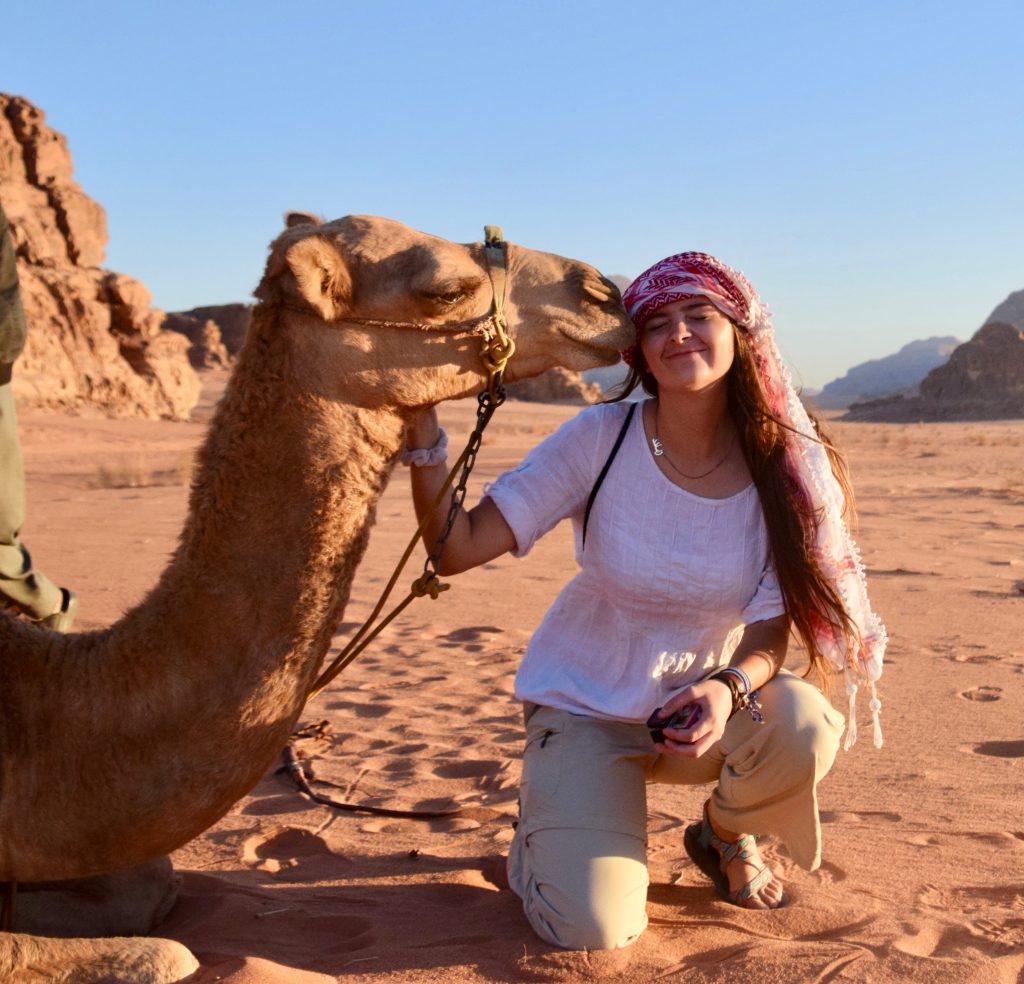
Five times a day voices raised in prayer echo across the city on loudspeakers. The rhythmic chants of worship bounce across stone walls and streets of bustling passersby and guards. The busy city stops as devout Muslims kneel in prayer.
Hearing the daily call to prayer was one of Amanda Solomon’s favorite rituals during her time studying Arabic in Jordan last semester.
Solomon, a junior at BYU studying Middle Eastern studies and Arabic, participated in BYU’s Jordan Intensive Arabic program last fall. BYU’s Arabic Department Head Kirk Belnap runs the program, which allowed 33 BYU students to study Arabic while living in Amman, the capital of Jordan.
“BYU graduates more advanced-level speakers than any other school in the country,” Belnap said. “That’s partly a function of the fact we put more students into a rigorous semester abroad than anyone else. This is an intensive program, and people really respond to that. They really work hard, and we have a great time.”
The program’s rigorous schedule includes intensive Arabic language and culture classes during the day, as well as private language tutoring sessions and an additional two hours of Arabic language practice with native speakers.

Solomon and other BYU students volunteered several times a week at the Collateral Repair Project Refugee Center, teaching elementary and middle school boys ranging from 8 to 13 years old. Many of the youths were recently displaced from Iraq and Syria.
BYU students played games, conducted science experiments and even taught yoga and meditation to refugee children. Connecting with Arab youths allowed the students to improve their language skills and create enduring friendships across cultures.
Faith in Jordan
Jordan’s faith-filled culture had a large impact on the students.
Amman has one LDS Arab branch and one expatriate branch. BYU students attended the Arabic branch during their stay in Jordan. Solomon said there were usually 10 to 15 people in the Arabic branch.
The expatriate branch is somewhat larger and is composed of individuals from many countries, including Americans working for the embassy and individuals from the Philippines. Many Arab members found the LDS Church while living abroad or through family members.
“It was amazing to see how (members) brought their Arab culture and their Middle Eastern heritage to the church and how those came together and strengthened each other,” Solomon said. “Seeing the way that the church is still growing in the Middle East … emphasized to me that God has love for all of his children.”
Solomon said one misconception many students have is that Muslims and Mormons do not worship the same God. This couldn’t be further from the truth, as Muslims and Mormons worship the same God and have many similar beliefs, Solomon said.

“The Middle East is so misunderstood, but it’s a lot closer to us than we realize, especially in religion,” Solomon said. “We both have really strong principles of fasting and prayer and family togetherness. The family is super important (in Muslim culture).”
While seeing the suffering of refugees and Jordanians was difficult, Solomon said it provided her the opportunity to trust in God’s plan.
“Seeing them and their lives — they don’t know where they will end up — that was hard to see,” Solomon said. “I had to pray about it, and I still don’t have an answer as to why that happens to some people. But I know that God knows they are there, and he feels their pain more acutely then I do. He is aware of them.”
Politics amidst crisis
For BYU student Jonathan Lifferth, a Middle Eastern studies and Arabic major, insight into the political conflict surrounding Jordan made the study abroad experience particularly meaningful.
While Jordan is fraught with political tensions, Lifferth said the majority of his interactions with Arabs were positive. Many Jordanians told students that while they do not agree with current American policy, they still embrace the U.S. students as friends.

Lifferth said he began his study abroad experience in Jordan with three political and social questions: How are women treated in the Middle East? How is same-gender attraction addressed? Is anti-Semitism prevalent?
“There are strong gender roles, but I was impressed with how many women have access to education,” Lifferth said. “Around 60 percent of college graduates in Jordan are women. Many of them told me that they don’t feel pressure to conform or stay at home. They feel free to pursue their educations, and they don’t wear hijab if they don’t want to.”
Lifferth said homosexuality is a topic many people do not feel comfortable discussing.
“There is a lot of social pressure against it, and it is very culturally taboo,” Lifferth said.
The majority of Jordanians said they do not identify as anti-Semites, Lifferth found. Rather, Lifferth said Jordanians respect Jews as a race and a religion. It is the state of Israel that Jordanians dislike.
Living in the center of the Israeli-Palestinian conflict taught Lifferth to be hesitant before making judgments about people or drawing conclusions about situations.
“There were so many perspectives that widened my view,” Lifferth said. “You can’t put all people into one category. You have to really expand your mind to see every aspect of a situation.”
Palestine: A sacred experience
The students visited Jerusalem during their final two weeks, an experience Belnap described as “one of the jewels of the study abroad program.”
During the trip to Jerusalem, led by Belnap and political science professor Joshua Gubler, students visited biblical sites while learning about the Arab-Israeli conflict from the side opposing Jordan.
For BYU student Melena Warden, a junior studying Middle Eastern studies and Arabic, it was the trip to Palestine-Israel that changed her perspective on conflict and tolerance.

“It’s amazing because we get to study the conflict from both sides — Jordan and from Palestine-Israel,” Warden said. “Jordan was amazing, but Jerusalem opened new pathways for my future … The extremes of the conflict highlight extremes in our society — and on campus. We just don’t ask other people how they feel or try to understand their history. Studying extreme cases allowed me to understand issues of conflict in our own society.”
Creating real relationships with Arabs on both sides of the conflict allowed Warden to better understand her own beliefs.
“Because I became close with so many people, I was able to learn what they really believe and step into their views,” Warden said. “That allowed me to learn a lot about myself and solidify my own beliefs.”
Warden said a main takeaway from her experience was to have an open mind towards those who do not share her same culture or beliefs.
“God is all-loving and all-aware of his children, no matter where they are,” Warden said. “The same way he has spoken to me and led me, he is doing for them too.”
Taking Jordan home
Solomon, Warden and Lifferth each think of their experiences in Jordan as gifts that will guide their future careers and life missions. All three plan to return to Jordan and surrounding countries to continue to serve the Arab people, either through humanitarian aid or social work.
“I just want to go where God puts me and use my Arabic in the process,” Solomon said.




